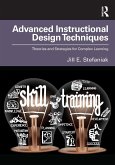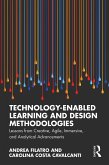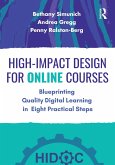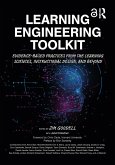Trends and Issues in Instructional Design and Technology (eBook, PDF)
Redaktion: Reiser, Robert A.; Dempsey, John V.; Carr-Chellman, Alison A.
65,95 €
65,95 €
inkl. MwSt.
Sofort per Download lieferbar

33 °P sammeln
65,95 €
Als Download kaufen

65,95 €
inkl. MwSt.
Sofort per Download lieferbar

33 °P sammeln
Jetzt verschenken
Alle Infos zum eBook verschenken
65,95 €
inkl. MwSt.
Sofort per Download lieferbar
Alle Infos zum eBook verschenken

33 °P sammeln
Trends and Issues in Instructional Design and Technology (eBook, PDF)
Redaktion: Reiser, Robert A.; Dempsey, John V.; Carr-Chellman, Alison A.
- Format: PDF
- Merkliste
- Auf die Merkliste
- Bewerten Bewerten
- Teilen
- Produkt teilen
- Produkterinnerung
- Produkterinnerung

Bitte loggen Sie sich zunächst in Ihr Kundenkonto ein oder registrieren Sie sich bei
bücher.de, um das eBook-Abo tolino select nutzen zu können.
Hier können Sie sich einloggen
Hier können Sie sich einloggen
Sie sind bereits eingeloggt. Klicken Sie auf 2. tolino select Abo, um fortzufahren.

Bitte loggen Sie sich zunächst in Ihr Kundenkonto ein oder registrieren Sie sich bei bücher.de, um das eBook-Abo tolino select nutzen zu können.
Trends and Issues in Instructional Design and Technology provides current and future IDT professionals with a clear picture of current and future developments in the field that are likely to impact their careers and the organizations they work for.
- Geräte: PC
- mit Kopierschutz
- eBook Hilfe
Andere Kunden interessierten sich auch für
![Trends and Issues in Instructional Design and Technology (eBook, ePUB) Trends and Issues in Instructional Design and Technology (eBook, ePUB)]() Trends and Issues in Instructional Design and Technology (eBook, ePUB)65,95 €
Trends and Issues in Instructional Design and Technology (eBook, ePUB)65,95 €![Advanced Instructional Design Techniques (eBook, PDF) Advanced Instructional Design Techniques (eBook, PDF)]() Jill E. StefaniakAdvanced Instructional Design Techniques (eBook, PDF)53,95 €
Jill E. StefaniakAdvanced Instructional Design Techniques (eBook, PDF)53,95 €![The Essentials of Instructional Design (eBook, PDF) The Essentials of Instructional Design (eBook, PDF)]() Abbie H. BrownThe Essentials of Instructional Design (eBook, PDF)65,95 €
Abbie H. BrownThe Essentials of Instructional Design (eBook, PDF)65,95 €![Technology-Enabled Learning and Design Methodologies (eBook, PDF) Technology-Enabled Learning and Design Methodologies (eBook, PDF)]() Andrea FilatroTechnology-Enabled Learning and Design Methodologies (eBook, PDF)40,95 €
Andrea FilatroTechnology-Enabled Learning and Design Methodologies (eBook, PDF)40,95 €![High-Impact Design for Online Courses (eBook, PDF) High-Impact Design for Online Courses (eBook, PDF)]() Bethany SimunichHigh-Impact Design for Online Courses (eBook, PDF)39,95 €
Bethany SimunichHigh-Impact Design for Online Courses (eBook, PDF)39,95 €![Teaching Online (eBook, PDF) Teaching Online (eBook, PDF)]() Susan KoTeaching Online (eBook, PDF)44,95 €
Susan KoTeaching Online (eBook, PDF)44,95 €![Learning Engineering Toolkit (eBook, PDF) Learning Engineering Toolkit (eBook, PDF)]() Learning Engineering Toolkit (eBook, PDF)37,95 €
Learning Engineering Toolkit (eBook, PDF)37,95 €-
-
-
Trends and Issues in Instructional Design and Technology provides current and future IDT professionals with a clear picture of current and future developments in the field that are likely to impact their careers and the organizations they work for.
Dieser Download kann aus rechtlichen Gründen nur mit Rechnungsadresse in A, B, BG, CY, CZ, D, DK, EW, E, FIN, F, GR, HR, H, IRL, I, LT, L, LR, M, NL, PL, P, R, S, SLO, SK ausgeliefert werden.
Produktdetails
- Produktdetails
- Verlag: Taylor & Francis
- Seitenzahl: 656
- Erscheinungstermin: 6. August 2024
- Englisch
- ISBN-13: 9781040109052
- Artikelnr.: 72284991
- Verlag: Taylor & Francis
- Seitenzahl: 656
- Erscheinungstermin: 6. August 2024
- Englisch
- ISBN-13: 9781040109052
- Artikelnr.: 72284991
- Herstellerkennzeichnung Die Herstellerinformationen sind derzeit nicht verfügbar.
Robert A. Reiser is Professor Emeritus, former Associate Dean for Research, Robert M. Morgan Professor of Instructional Systems, and Distinguished Teaching Professor in the College of Education at Florida State University, USA. Alison A. Carr-Chellman is Dean of the School of Education and Health Sciences, and Professor of Teacher Education at the University of Dayton, USA. John V. Dempsey is retired Professor and founding Director of USAonline and the Innovation in Learning Center at the University South Alabama, USA.
1. What Field Did You Say You Were In?: Defining and Naming Our Field 2. A History of Instructional Design And Technology 3. Characteristics and Evolution of Foundational Instructional Design Models 4. You Only Need Three Crayons: An Instructional Design Theory 5. The Successive Approximation Model (SAM) 6. Psychological Foundations of Instructional Design 7. Constructivism for Active, Authentic Learning 8. The Learning Sciences: Where They Came from and What It Means for Instructional Designers 9. Motivation, Volition, and Performance 10. Profound Learning for Human Flourishing 11. Systems Influence on Instructional Design and Technology 12. Social Emotional Learning 13. Problem-Based Learning: Essential Design Characteristics 14. Keep It Real: The Benefits of Authentic Tasks in Contemporary Learning Environments 15. Evaluation in Instructional Design: A Comparison of the Major Evaluation Models 16. Measuring the Return on Investment (ROI) in Technology-Based Learning 17. Learning Engineering 18. The Role of Human Performance Technology in Learning Design 19. Informal Learning 20. Problems, Potential, and Promise of Open Badges: Creating a Design Strategy 21. Instructional Design in Business and Industry 22. Instructional Design Opportunities in Military Education and Training Environments 23. What Should IDs Do to Advance Health Professions Education? 24. Integrating Technology into K-12 Education 25. Instructional Designers in Higher Education 26. Stories From the Globe: Practitioners' Voices on Instructional Design and Technology 27. Leaving All Doors Open: Career Options for Those Studying Instructional Design and Technology 28. Getting an Instructional Design Position: Lessons From a Personal History 29. Avenues to Support the Professional Development of Instructional Designers 30. Performance Consulting 31. Hybrid Classroom Design and Implementation: Electronic Synchronous Multi-Site (ESyMS) Learning 32. Learning with Podcasts 33. Social Media and Instructional Design 34. Artificial Intelligence (AI) 35. Designing for E-Learning 36. Designing Educational Videogames: Balancing Learning, Assessment, and Fun 37. Professional Ethics: Design Practices for an Embedded Approach 38. Diversity and Inclusion in Design for Learning and Human Performance Technologies 39. Changing Conceptions of Design 40. Future Research Directions for Instructional Design and Technology 41. Epilogue
1. What Field Did You Say You Were In?: Defining and Naming Our Field 2. A History of Instructional Design And Technology 3. Characteristics and Evolution of Foundational Instructional Design Models 4. You Only Need Three Crayons: An Instructional Design Theory 5. The Successive Approximation Model (SAM) 6. Psychological Foundations of Instructional Design 7. Constructivism for Active, Authentic Learning 8. The Learning Sciences: Where They Came from and What It Means for Instructional Designers 9. Motivation, Volition, and Performance 10. Profound Learning for Human Flourishing 11. Systems Influence on Instructional Design and Technology 12. Social Emotional Learning 13. Problem-Based Learning: Essential Design Characteristics 14. Keep It Real: The Benefits of Authentic Tasks in Contemporary Learning Environments 15. Evaluation in Instructional Design: A Comparison of the Major Evaluation Models 16. Measuring the Return on Investment (ROI) in Technology-Based Learning 17. Learning Engineering 18. The Role of Human Performance Technology in Learning Design 19. Informal Learning 20. Problems, Potential, and Promise of Open Badges: Creating a Design Strategy 21. Instructional Design in Business and Industry 22. Instructional Design Opportunities in Military Education and Training Environments 23. What Should IDs Do to Advance Health Professions Education? 24. Integrating Technology into K-12 Education 25. Instructional Designers in Higher Education 26. Stories From the Globe: Practitioners' Voices on Instructional Design and Technology 27. Leaving All Doors Open: Career Options for Those Studying Instructional Design and Technology 28. Getting an Instructional Design Position: Lessons From a Personal History 29. Avenues to Support the Professional Development of Instructional Designers 30. Performance Consulting 31. Hybrid Classroom Design and Implementation: Electronic Synchronous Multi-Site (ESyMS) Learning 32. Learning with Podcasts 33. Social Media and Instructional Design 34. Artificial Intelligence (AI) 35. Designing for E-Learning 36. Designing Educational Videogames: Balancing Learning, Assessment, and Fun 37. Professional Ethics: Design Practices for an Embedded Approach 38. Diversity and Inclusion in Design for Learning and Human Performance Technologies 39. Changing Conceptions of Design 40. Future Research Directions for Instructional Design and Technology 41. Epilogue







